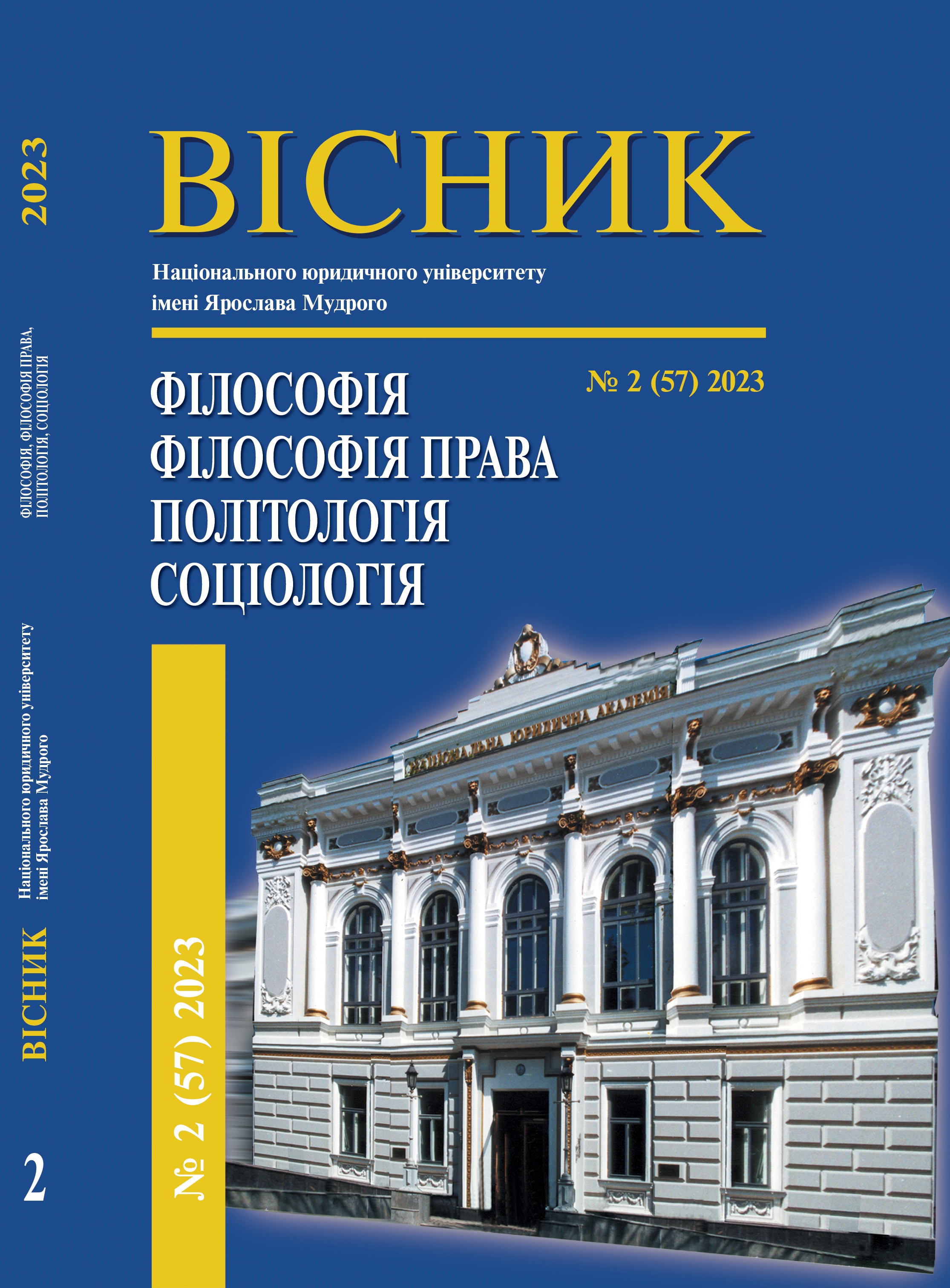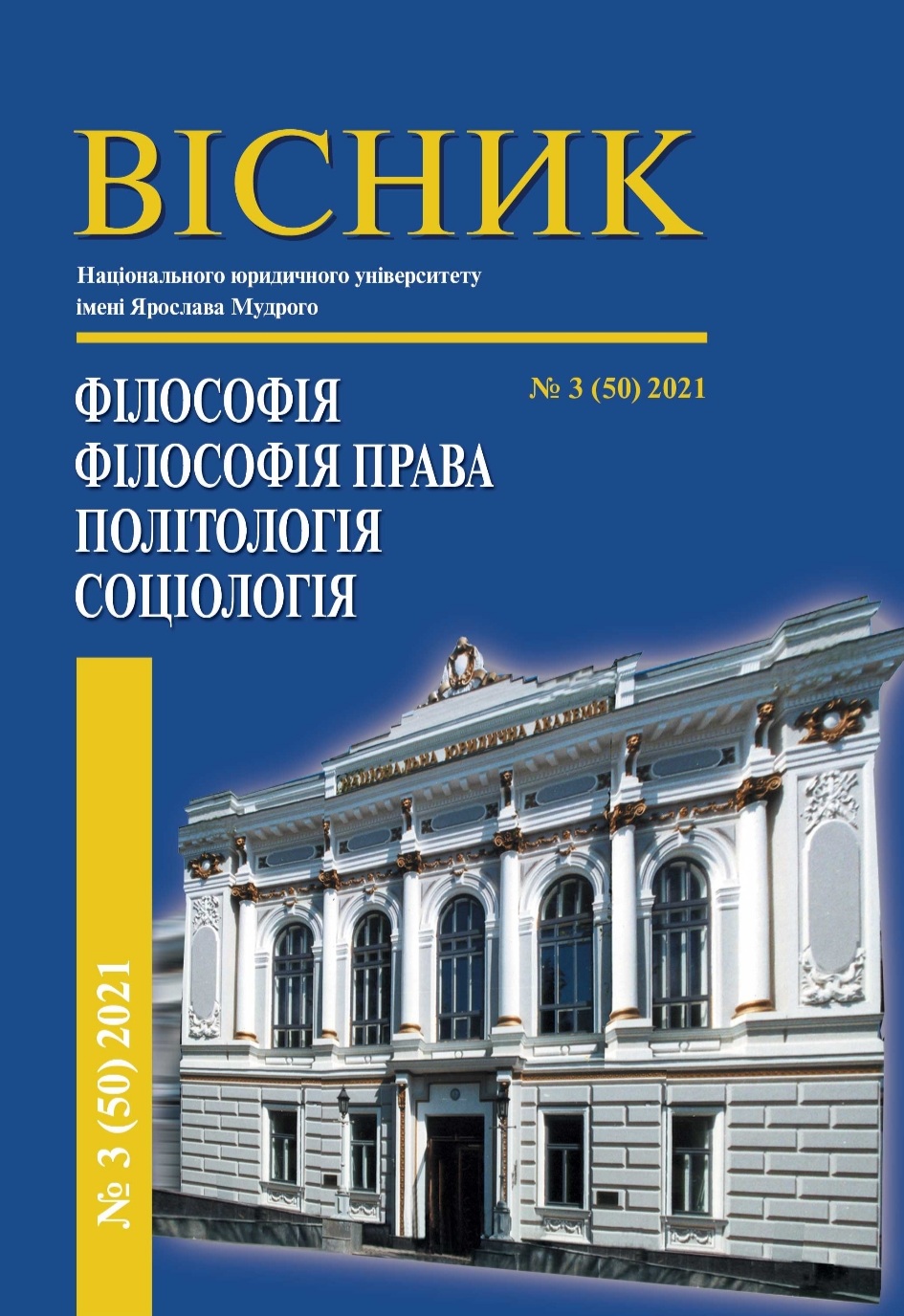РІЗНОМАНІТНІСТЬ ІСНУВАННЯ ЛЮДИНИ У КІБЕРПРОСТОРУ ЯК ОСНОВА ФОРМУВАННЯ АНТРОПОЛОГІЧНОГО НАПРЯМКУ ЙОГО ДОСЛІДЖЕННЯ
DOI:
https://doi.org/10.21564/2663-5704.57.276665Ключові слова:
кіберпростір, законослухняний користувач, кіберзлочинність, кіберзлочинець, антропологічний напрямокАнотація
У публікації досліджуються різноманітні аспекти існування людини у кіберпросторі. Звертається увага на те, що сьогодні кіберпростір є необхідною умовою нормальної життєдіяльності людини. Він охопив як старі, традиційні сфери людського життя, так і створює нові, потребу в яких викликає сучасний розвиток суспільства. Звертається увага і на проблему кіберзлочинності, як явище, що теж отримало розвиток у цифровій реальності. В цілому публікацією доводиться необхідність існування антропологічного напрямку дослідження кіберпростору.
Посилання
Zvit pro rezulʹtaty roboty Departamentu kiberpolitsiyi u 2022 rotsi. (2022). URL: https://cyberpolice.gov.ua/news/zvit-pro-rezultaty-roboty-departamentu-kiberpolicziyi-u-roczi-969/ [in Ukrainian].
Svilicic, N. (2012). Cyber Anthropology or Anthropology in Cyberspace. Collegium antropologicum, 36 (1), 271–280.
Young, H., Van Vliet, T., Van de Ven, J., Jol, S., Broekman C. (2018). Understanding Human Factors in Cyber Security as a Dynamic System. International Conference on Human Factors in Cybersecurity (AHFE): proceedings of the International Conference on Human Factors in Cybersecurity (AHFE). Los Angeles. 244–254.
Saura, J., Reyes-Menendez, A., de Matos, N., Correia, M., Palos-Sanchez, P. (2020). Consumer behavior in the digital age. Journal of spatial and organizational dynamics, 8 (3), 190–196.
Shcho take darknet i chy naspravdi vin takyy nebezpechnyy. (2021). URL: https://suspilne.media/170190-so-take-darknet-i-ci-spravdi-vin-takij-nebezpecnij/ [in Ukrainian].
Pinder, C., Vermeulen, J., Cowan, B., Beale, R. (2018). Digital Behaviour Change Interventions to Break and Form Habits. ACM transactions on computer-human interaction, 25 (3), P. 1– 66.
Yu, T.-K., Lin, M.-L., Liao, Y.-K. (2017). Understanding factors influencing information communication technology adoption behavior: The moderators of information literacy and digital skills. Computers in Human Behavior, 71, 196-208.
Achutti, C. (2017). Learning digital and technology literacy in the era of exponential rate of changes. 9 th International conference on education and new learning technologies (edulearn17): proceedings 9 th International conference on education and new learning technologies (edulearn17). Barcelona, 4778–4785.
Rybanska, J., Kosiciarova, I., Nagyova, L. (2015). Negative psychological aspects of consumer behaviour in the digital age. International Scientific Conference on Marketing Identity - Digital Life: proceedings of the International Scientific Conference on Marketing Identity - Digital Life. Smolenice, 220–232.
Dodel, M., Mesch, G. (2018). Inequality in digital skills and the adoption of online safety behaviors. Information communication & society, 21 (5), 712–728.
Ostmeier, E., Strobel, M. (2022). Building skills in the context of digital transformation: How industry digital maturity drives proactive skill development. Journal of business research,139, 718–730.
Pangrazio, L., Godhe, A.-L., Ledesma, L., Gonzalez, А. (2020). What is digital literacy? A comparative review of publications across three language contexts. E-learning and digital media, 17 (6), 442–459.
Anthonysamy, L., Sivakuma,r P. (2022). A new digital literacy framework to mitigate misinformation in social media infodemic. Global knowledge memory and communication. URL: https://www.emerald.com/insight/content/doi/10.1108/GKMC-06-2022-0142/full/html.
Helsper, E.J., Smahel, D. (2020). Excessive internet use by young Europeans: psychological vulnerability and digital literacy? Information communication & society, 23 (9), 1255– 273.
Taylor-Jackson, J., McAlaney, J.,Foster J., Bello, A., Maurushat, A., Dale, J. (2020). Incorporating Psychology into Cyber Security Education: A Pedagogical Approach. 24th International Conference on Financial Cryptography and Data Security (FC): proceedings of the 24th International Conference on Financial Cryptography and Data Security (FC). Kota Kinabalu, 207 – 217.
Naselennya Zemli shvydko stariye, ne vystachaye pratsivnykiv. Chy hotova do tsʹoho svitova ekonomika i shcho chekaye na Ukrayinu? (2022). URL: https://www.epravda.com.ua/publications/2022/01/26/681778/ [in Ukrainian].
Li, Q., Luximon, Y. (2016). Older Adults and Digital Technology: A Study of User Perception and Usage Behavior. International Conference on Physical Ergonomics and Human Factors: proceedings of the International Conference on Physical Ergonomics and Human Factors. FL, 155–163.
Wang, J., Liu, C., Cai, Z. (2022). Digital literacy and subjective happiness of low-income groups: Evidence from rural China. Frontiers in psychology, 13. URL: https://www.frontiersin.org/articles/10.3389/fpsyg.2022.1045187/full.
Neigel, A., Claypoole, V., Waldfogle, G., Acharya, S., Hancock, G. (2020). Holistic cyber hygiene education: Accounting for the human factors. Computers & security, 92, 101731.
Kranenbarg, M. (2022). When do they offend together? Comparing co-offending between different types of cyber-offenses and traditional offenses. Computers in human behavior, 130. URL: https://reader.elsevier.com/reader/sd/pii/S0747563222000085?token=68BE22037551F2B3CC5F521E2EF512A52A56025518A27276B3A8E3F16FC62B7BC72323CC2289CB40657C7608137424C3&originRegion=eu-west-1&originCreation=20230311112032.
Kranenbarg, M., Van Gelder, J., Barends, A., de Vries, R. (2023). Is there a cybercriminal personality? Comparing cyber offenders and offline offenders on HEXACO personality domains and their underlying facets. Computers in human behavior, 140. URL: https://reader.elsevier.com/reader/sd/pii/S074756322200396X?token=C9F3890E0ABEF9E274DB15A6994911920CC80FF285240583DA1D8088DCB356C061E56BEA3E5E136F0EA60C99A99221B5&originRegion=eu-west-1&originCreation=20230311100956.
Leukfeldt, E., Roks, R. (2021). Cybercrimes on the Streets of the Netherlands? An Exploration of the Intersection of Cybercrimes and Street Crimes. Deviant behavior. 42 (11), 1458 – 1469.
Park, J., Cho, D., Lee, J., Lee, B. (2019). The Economics of Cybercrime: The Role of Broadband and Socioeconomic Status. ACM Transactions on Management Information Systems, 10, 4, 13, 1–23.




